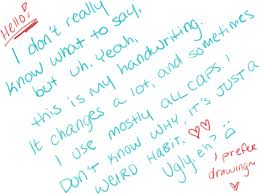Is Handwriting an Important Part of Language and Literacy Instruction?
Since I first learned how to write the alphabet I’ve had a fetish with improving my handwriting. I did not have a notebook, folder, or scratch paper throughout my entire schooling that was not covered with writing in every which way. I was determined to find the perfect way of presenting myself on paper. There was nothing that bothered me more than to feel like one of my peers had a better style of handwriting than me. I will never forget Paige Miller* and how she always seemed to be one step ahead of me on the handwriting front. As soon as I would be satisfied with my style, I would see her latest handwriting innovation and

After years of playing around with different ways of writing my “a’s,” “
What does the research say?
Dr. Laura Dinehart of Florida International University School of Education has found that a 4-year-old’s fine motor writing skills are more predictive of later academic achievement than early number skills or early language skills. Dinehart’s team was able to discover this by examining the scores of
Not only were students with better penmanship in pre-k found to have higher scores in both reading and math later on, but they also had higher grades in general and higher scores on standardized tests. Students with strong handwriting marks in pre-k were found to have an overall “B” average in second grade compared to an overall “C” average for the students that did poorly on writing tasks in pre-K.
The only problem with the study: researchers don’t know why.
Schools are dropping handwriting from their curriculum and researchers are finding how predictive this skill is to future success, but no one knows why that is. Is handwriting’s benefit in today’s tech-savvy,
Dr. Dinehart did point out in her report that studies have found that children who physically write letters recognize them more readily than students who type them on the keyboard, possibly meaning that handwriting instruction leads to better reading skills. However, more research still needs to be done.
But, although the link is yet to be discovered, there is a link. Schools may be jumping off the handwriting bandwagon too early. As Dr. Dinehart said: “What we do know is that kids with greater experiences in early childhood do better later on, and writing can’t be discounted from that.”
Although the link between good penmanship and strong performance isn't concrete, studies show that explicit phonics instruction has a huge impact on reading performance.
*Name has been changed.
Reading Horizons reading curriculum helps improve reading, writing, spelling, and pronunciation skills. Learn more about the Reading Horizons Discovery elementary reading program and the Reading Horizons Elevate reading intervention curriculum.
5 Comments

J ARTHUR MELANSON said
Think about the handwriting of most doctors. Then ask, "Is there a relationship between IQ and handwriting?" Doctors had to test well in K-12 to be accepted into and complete medical school. Did they earn high marks for handwriting in pre-K? What caused their handwriting to deteriorate? Is the answer merely HASTE? Do pre-K students who produce legible handwriting possess the character traits of (1) good cooperation with instruction (2) a good work ethic? These three: average or above-average IQ, cooperation with reasonable instructional routines, and a willingness to work hard at learning should produce successful students.

Mark Taylor said
Thank you for your article. I am baffled how schools seem to be now-focus instead of future oriented in regards to this issue. I can understand their desire to teach children about technology, but handwriting is one of the most important forms of expression and should not be replaced. When the calculator was invented, we didn't eliminate math. We should not dismiss handwriting in our public schools.

angela said
J Arthur, interesting point about doctors. It would be an interesting study to look at what their marks were in pre-k... Mark, I completely agree. I loved your point about how we didn't stop teaching math when the calculator was invented!

alero omede said
YES PENMANSHIP IMPROVES KNOWLEDGE BECAUSE WHAT U WRITE WITH YOUR HANDS HAVE A WAY OF BEING RETAINED IN YOUR MEMORY WHEN THE NEED TO RECALL IT IS NECESSARY.

patricia Delzell said
I need to get in touch with J. Arthur Melanson!!